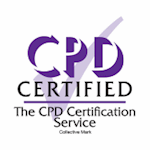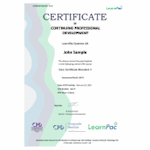Care Certificate Standard 3 - Duty of Care
CPDUK Accredited | Instant Course Access | Includes Assessment & Certificate | Instant Certificate Download
LearnPac Systems
Summary
- Exam(s) / assessment(s) is included in price
- Tutor is available to students
Add to basket or enquire
Overview
Care Certificate Standard 3 - Duty of Care | Online Training Course | CPDUK Accredited.
Welcome to our Care Certificate Standard 3 - Duty of Care online course. All our online training courses, programmes and qualifications are accredited by the CPD Certification Service (CPDUK).
Care Certificate Standard 3 focuses on the duty of care, which is the moral and legal responsibility to ensure the safety and well-being of individuals receiving care and support. This entails promoting their well-being protecting them against harm, abuse, and injury. It also addresses handling complaints, incidents and accidents, and conflicts. Adhering to the duty of care creates a safe and nurturing environment for individuals in healthcare and adult social care settings.
Certificate duration: N/A
Entry requirements: No entry restrictions
Recommended prerequisites: N/A
Assessment type: End of course assessment
Assessment pass mark – 80% needed to pass and gain a CPD certificate
Cost(s) of assessment and certification – All costs included in the course price
Awarding/Accrediting body – CPD Certification Service (CPDUK)
Care Certificate Standard 3 - Duty of Care | Online Training Course | CPDUK Accredited.
CPD
Course media
Description
Course aims
The aims of this Care Certificate Standard 3 - Duty of Care online course are to:
- Appreciate the importance of personalised care.
- Promote the wellbeing of service users.
- Realise the importance of cushioning service users from harm, injury and abuse.
Learning objectives
On completion of this Care Certificate Standard 3 - Duty of Care online course, the learner will be able to:
- Outline the challenges that may occur between the duty of care and an individual’s rights.
- Describe the best person to ask for advice and support in handling comments and complaints.
- Describe the ways of recognising adverse events, incidents, errors and near misses.
- Explain the pros and cons of adverse events, incidents, errors and near misses.
- Enumerate the legislation and accepted ways of working about reporting any adverse events, incidents, errors and near misses.
- Identify the factors and difficult situations that may cause confrontation.
- Describe risk assessment strategies in confrontational situations.
Learning outcomes
On completion of this Care Certificate Standard 3 - Duty of Care online course, the learner will be able to:
- Describe the challenges that may occur between the duty of care and an individual’s rights.
- Explain the essential things to do in managing conflicts and dilemmas.
- Explain the significance of learning from comments and complaints to improve service quality.
- Enumerate the legislation and the approved ways of working about reporting any adverse events, incidents, errors and near misses.
- Identify the factors and difficult situations that may cause confrontation.
- Specify the appropriate ways of reporting any workplace confrontations.
Why is this course essential?
In this course, you will learn your duties and responsibilities to all those receiving your care and support. Through this, you can help promote workplace wellness and safety. You will understand your duties and responsibilities to all those receiving your care and support at work. This means promoting wellbeing and ensuring that people are free from harm, abuse and injury.
What is covered in this course?
This Care Certificate Standard 3 - Duty of Care online course is divided into the following sections:
- Unit 1 – Introduction
- Unit 2 – What is duty of care?
- Unit 3 – Supporting independence
- Unit 4 – Dealing with comments, concerns and complaints
- Unit 5 – Relevant legislation
- Unit 6 – Managing conflict in the workplace
- Summary
- End of course assessment.
Who is this course for?
The Care Certificate Standard 3 - Duty of Care was developed for new healthcare and social care staff as part of their workplace induction.
The primary audience of the Care Certificate is Healthcare Support Workers or Adult Social Care Workers. It is also suitable for existing health and social care staff who do not hold recognised qualifications.
Clinical support roles
The Care Certificate Standard 3 is suitable for those giving support to clinical roles in the NHS and other healthcare settings where there is any direct contact with patients, including:
- Health care assistants
- Care support workers
- Assistant practitioners.
Adult social care workers
The Care Certificate Standard 3 is also suitable for those giving support in community settings, including:
- Adult social care workers in residential, nursing homes and hospices
- Care home workers
- Domiciliary care staff.
Non-clinical roles
The Care Certificate Standard 3 is also suitable for other social care roles include:
- Caring volunteers
- Porters
- Cooks
- Drivers with direct contact with patients/service users.
Requirements
Learn anywhere, anytime on any device.
You will need access to a desktop computer, laptop, tablet or smartphone device to complete these online courses. You can start, pause/stop and return to where you left off.
Our courses utilise responsive design features, making them available on any device of your choice.
Care Certificate Standard 3 - Duty of Care | Online Training Course | CPDUK Accredited.
Career path
Our online courses and programmes range from introductory modules at Level 1 (awareness/beginner) to advanced and expert modules up to Level 6.
Our e-learning modules count towards CPD hours for professionals in various sectors as well as meeting mandatory and statutory requirements (where relevant).
Care Certificate Standard 3 - Duty of Care | Online Training Course | CPDUK Accredited.
Questions and answers
Currently there are no Q&As for this course. Be the first to ask a question.
Reviews
Currently there are no reviews for this course. Be the first to leave a review.
Legal information
This course is advertised on reed.co.uk by the Course Provider, whose terms and conditions apply. Purchases are made directly from the Course Provider, and as such, content and materials are supplied by the Course Provider directly. Reed is acting as agent and not reseller in relation to this course. Reed's only responsibility is to facilitate your payment for the course. It is your responsibility to review and agree to the Course Provider's terms and conditions and satisfy yourself as to the suitability of the course you intend to purchase. Reed will not have any responsibility for the content of the course and/or associated materials.





